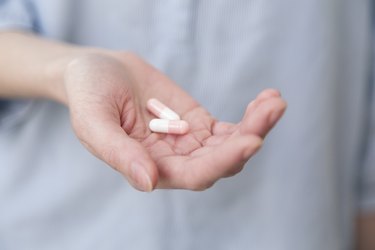
Spoiler alert: Both of these members of the B family are essential.
Generally speaking, B vitamins are necessary for a variety of functions, such as helping the body convert food into energy and assisting the body in proper cell formation. While there are eight vitamins that fall under the B category (and when all eight B vitamins are present in a supplement, it's referred to as B Complex), two of these vitamins — B6 and B12 — tend to get the most attention.
Video of the Day
Video of the Day
"Specific B vitamins, including vitamin B6 and vitamin B12, work together to reduce homocysteine [a type of amino acid] levels in the body — and heightened homocysteine levels may increase your risk of heart disease," Amy Gorin, RDN, owner of Amy Gorin Nutrition in the New York City area, tells LIVESTRONG.com.
A severe deficiency of B6 can led to depression, confusion or skin condition, per the Harvard T.H. Chan School of Public Health while a B12 deficiency may cause anemia, mood swings, intestinal problems and muscle weakness, per the Mayo Clinic.
"Yet if vitamin B6 deficiency exists, it is usually alongside a deficiency in vitamin B12 and perhaps folic acid (aka vitamin B9), as well," Gorin says, adding that people are rarely deficient in either vitamin.
All About Vitamin B6
For starters, vitamin B6 is involved in more than 100 enzymatic reactions within the body, Gorin points out. "Most of these reactions include ones connected with protein metabolism. Plus, vitamin B6 is involved with cognitive development and immune health."
The Mayo Clinic states that vitamin B6 has been shown to reduce the severity of morning sickness in pregnant women while some preliminary research has found that it might also help minimize PMS symptoms.
The Recommended Daily Allowance (RDA) for vitamin B6 is 1.3 milligrams for adults up the age of 50. The dosage slightly increases starting at the age of 51 when the RDA for men is 1.7 milligrams and 1.5 milligrams for women. Certain health conditions, such as kidney disease, alcoholism and autoimmune conditions, may contribute to low levels of this vitamin.
Even though it's considered generally safe, an abundance of vitamin B6 may cause a lack of muscle control, gastrointestinal issues, numbness or sensitivity to sunlight.
What's So Great About Vitamin B12?
"Vitamin B12 is an important vitamin that plays a role in necessary functions within your body, such as the production of red blood cells and proper maintenance of the central nervous system," says Gorin. According to the Harvard T.H. Chan School of Public Health, this vitamin is also vital for producing DNA and the development and function of brain cells.
In fact, levels of vitamin B12 decrease with age. Adults between the ages of 61 and 80 who participated in the research had nearly three times less of this vitamin in their brain compared to younger, healthy adults, according to a January 2016 study published in the journal PLOS One.
However, it's important to note that long-term high-dose intake from individual supplements — but not from multivitamins — is associated with a 30 to 40 percent increase in lung cancer risk in men only, research published in an August 2017 edition of Journal of Clinical Oncology found.
The current RDA for vitamin B12 is 2.4 micrograms for adults. "Since many sources of vitamin B12 are animal-based, vegetarians and vegans tend to be low in this vitamin," says Gorin. "And keep in mind that both vitamins are water-soluble, meaning your body doesn't keep large stores of them. Therefore, it's important to get the nutrients from food, supplements or both."
Food Sources of Vitamins B6 and B12
1. Beef
"Per 3-ounce serving of cooked round top round steak like London broil (with the fat trimmed away), you'll receive 61 percent of the daily value (DV) for vitamin B12 and 20 percent of the DV for vitamin B6," says Gorin. "Beef also provides heme iron, which is animal-based iron that's well-absorbed by the body."
2. Chicken Breast
A popular type of poultry, a 6-ounce serving of lean chicken breast offers 92 percent of your DV for B6 and 14 percent DV of B12. It also packs in about 55 grams of protein.
3. Salmon
"In a 3-ounce serving of wild salmon, you'll get more than 100 percent of the DV for vitamin B12 as well as 47 percent of the DV for vitamin B6," says Gorin. "Plus, you'll also get a little bit of iron, too [5 percent of the DV]."
4. Fortified Breakfast Cereal
"This is one of the best ways for vegetarians to get a dose of vitamin B12 and vitamin B6 from a singular food," states Gorin. "But not all cereals are fortified with vitamin B12, so make sure to check the label." For example, a 1-cup serving of fortified corn flakes provides 63 percent of the DV for vitamin B12 and 29 percent of the DV for vitamin B6. "I love adding cereal to my Greek yogurt parfait," she adds.
5. Nutritional Yeast
"This is another go-to vegetarian source of vitamin B12 and vitamin B6." A 1-ounce serving of nutritional yeast flakes offers a whopping 576 percent of the DV for B12 and 1,001 percent of the DV of B6! Nutritional yeast provides a savory, cheese-like flavor and makes a great topping for popcorn and roasted veggies.
- Harvard School of Public Health: "B Vitamins"
- MedlinePLus.gov: "Homocysteine Test"
- Harvad School of Public Health: "Vitamin B6"
- Mayo Clinic: "Vitamin B-12"
- Mayo Clinic: "Vitamin B-6"
- Harvard School of Public Health: "Vitamin B12"
- Plos One: "Decreased Brain Levels of Vitamin B12 in Aging, Autism and Schizophrenia"
- Journal of Clinical Oncology:"Long-Term, Supplemental, One-Carbon Metabolism Related Vitamin B Use in Relation to Lung Cancer Risk"
- NIH: "Vitamin B 12"
- MyFoodData: "London Broil"
- MyFoodData: "Lean Chicken Breast"
- MyFoodData: "Wild Atlantic Salmon"
- MyFoodData: "Fortiefied Corn Flakes"
- MyFoodData: "Savory Nutritional Yeast Flakes"